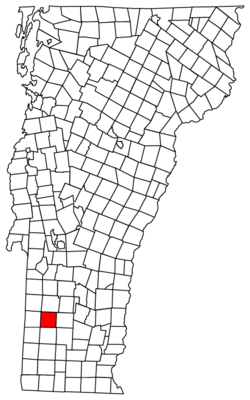Manchester, Vermont
| Manchester, Vermont | |
|---|---|
| Town | |

Bennington County Courthouse in Manchester Village
|
|
 Manchester, Vermont |
|
| Location in the United States | |
| Coordinates: 43°8′27″N 73°4′48″W / 43.14083°N 73.08000°WCoordinates: 43°8′27″N 73°4′48″W / 43.14083°N 73.08000°W | |
| Country |
|
| State |
|
| County | Bennington |
| Area | |
| • Total | 42.2 sq mi (109.4 km2) |
| • Land | 42.1 sq mi (109.1 km2) |
| • Water | 0.1 sq mi (0.3 km2) |
| Elevation | 899 ft (281 m) |
| Population (2010) | |
| • Total | 4,391 |
| • Density | 104/sq mi (40.2/km2) |
| Time zone | Eastern (EST) (UTC-5) |
| • Summer (DST) | EDT (UTC-4) |
| ZIP code | 05254 |
| Area code(s) | 802 |
| FIPS code | 50-42850 |
| GNIS feature ID | 1462142 |
| Website | manchester-vt |
Manchester is a town in, and one of two shire towns (county seats) of, Bennington County, Vermont, United States. The population was 4,391 at the 2010 census.
Manchester Village, an incorporated village, and Manchester Center are settlement centers within the town.
Manchester has become a tourist destination, especially for those from New York and Connecticut, offering visitors factory outlet stores of national chain retailers such as Brooks Brothers and Ralph Lauren, as well as many locally owned businesses, including the Northshire Bookstore, one of America's leading independent bookstores.
The town was one of several chartered in 1761 by Benning Wentworth, colonial governor of New Hampshire. It was his custom to name new towns after prominent English aristocrats of the day, hoping they might adopt a patronly interest in their namesakes. Wentworth named Manchester for Robert Montagu, 3rd Duke of Manchester. First settled in 1764, the town was laid out in 1784. The land was better suited for grazing than tillage, so by 1839 about 6,000 sheep roamed the pastures and hillsides.
Other industries came to include iron mines, marble quarries and mills, and lumber companies. The arrival of the railroad from industrialized centers like New York City brought tourists, drawn by Manchester's historic architecture and beautiful setting among mountains. Following the Civil War, the town developed into an affluent resort area, which it remains today.
...
Wikipedia

